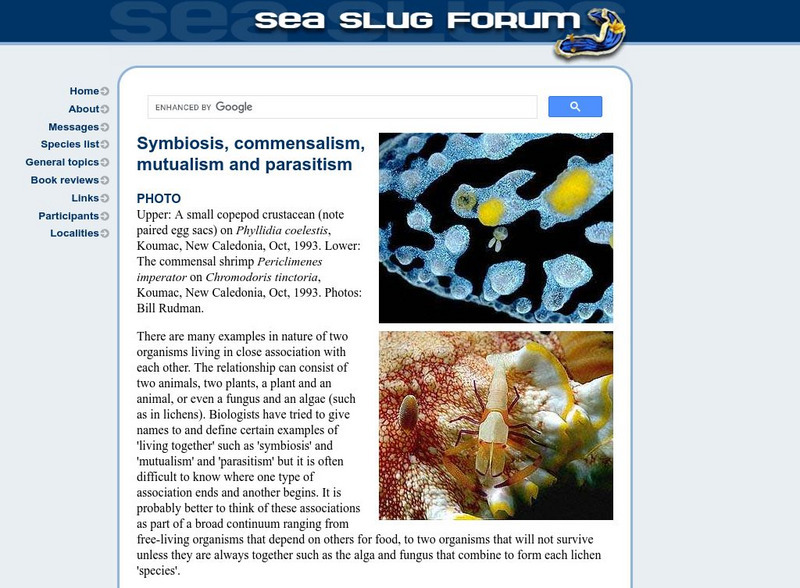Hi, what do you want to do?
Science 4 Inquiry
Frenemies, Bros and Killers: A Lesson in Symbiosis
Animals and plants develop relationships and rely on each other to survive. Pupils learn more about symbiosis through a video, a hands-on matching activity, and a game. They differentiate and describe each type on a written evaluation.
Scholastic
Study Jams: Symbiosis
Three types of symbiosis are explained: parasitism, commensalism, and mutualism. This is done with colorful animation and lively dialogue in a straightforward and easy-to-follow manner. Have your ecology class watch this at home and then...
Science Friday
Termite Symbiosis
What happens to the wood a termite eats? Pupils learn about the three types of symbiosis with pictures of symbiotic pairs. Afterward, they determine whether there is a symbiotic relationship with a termite by dissecting termites and...
CK-12 Foundation
Symbiosis: Mutualism, Commensalism, and Parasitism
Hyenas normally hunt alone, however scientists discovered that in Israel, hyenas hunt with wolf packs. When relationships develop between different species, we call it symbiosis. The videos teach about the three types of symbiosis and an...
NOAA
Microfriends
Is there medicine found in the organisms that live deep below the surface of the ocean? The fifth lesson in a six-part series has learners team up to research bacteria and the relationship it has with nearly every living thing on Earth....
Virginia Department of Education
Ecosystem Dynamics
Searching for an eccentric way to enhance lessons on ecosystems while ensuring pupils remain creative and motivated? Upon viewing The Lorax by Dr. Seuss, designated groups design and construct a pop-up book that...
Virginia Department of Education
Organisms in Symbiosis
Searching for an activity that allows emerging biologists to explore symbiosis up close and personal? Pupils collect samples and view lichens through a microscope and conclude with a discussion about the relationship they have...
Busch Gardens
Create an Invertebrate
What better way for young biologists to learn about invertebrates than by creating their very own? Here, students are assigned a set of invertebrate characteristics and are asked to invent an imaginary ocean animal...
Curated OER
Raven Chapter 54 Guided Notes: Community Ecology
Providing a sweeping overview of population and community interactions, this ecology worksheet gets learners thinking. They differentiate between habitat and niche, describe and give exemplars of various animal and plant defenses,...
Curated OER
Interactions of Living Things
Is it a producer, carnivore, omnivore, scavenger, or decomposer? Different relationships among organisms are explored here. It is a simple, multiple choice assignment. Use it as a quick warm-up or quiz.
Curated OER
Friend, Foe, or . . .
As a result of this activity, upper elementary ocean explorers will be able to describe several interrelationships: symbiosis, mutualism, commensalism, and parasitism. They learn that the biological richness is increased near seamounts...
Curated OER
Symbiosis: Help, Hinder or Destroy
Use background information and vocabulary to familiarize your students with the concept of symbiosis and the role agriculture plays in the shared relationship. They then write the vocabulary in their lab books or journals, and read the...
Curated OER
Symbiosis
In this symbiosis worksheet, students complete a graphic organizer about the three types of symbiosis. They define commensalism, mutualism, and parasitism and list the important things to remember about each.
Curated OER
Symbiosis: Helped, Harmed, or Neither?
In this symbiosis worksheet, students will brainstorm 2 examples of each different type of symbiotic relationship which includes mutualism, parasitism, and commensalism.
Curated OER
Nitrogen Fixation, OR What a Gas!
Students gain skill in the design, implementation, and reporting of a scientific research project using the scientific method. They set up an experiment to determine the effect of adding the Rhizobium bacteria to one group of legume...
Curated OER
Trials of Life: Living Together
For this trials for life worksheet, students fill in the charts as they watch a video. Students identify the types of symbiosis as mutualism, commensalism, parasitism, or predator-prey relationship.
Curated OER
What Relationship Do Species Have?
In this species relationships worksheet, students will brainstorm animals or plants that are examples of mutualism, commensalism, and parasitism.
Curated OER
Ms. Good Ch15-1 Word Search
In this economics learning exercise, students locate and identify various vocabulary terms related to economics and statistics. There are 14 words/phrases located in the puzzle.
University of South Florida
Project Oceanography: Single Celled Organisms [Pdf]
In this activity, students explore three kinds of symbiotic relationships involving unicellular organisms. They will also look more closely at the relationship between zooxanthellae and coral, and the importance of nitrogen-fixing...
Encyclopedia of Earth
Encyclopedia of Earth: Evolutionary Biology: Symbiosis
Article describes the different types of symbiosis, some of which are of mutual benefit, and others not. It also explains the differences between endosymbiosis and exosymbiosis, where one organism lives either inside or else upon the...
National Geographic
National Geographic: Ecological Relationships
In this lesson, students learn about different types of ecological relationships, including symbiosis, mutualism, commensalism, and parasitism. Includes handouts and a vocabulary list with definitions.
Other
Pde Sas: Relationships Among Organisms
In this lesson, students compare various types of relationships among organisms (i.e., biotic interactions). Students will: explain the roles of producers and consumers, and predators and prey in an ecosystem. Explain the levels of order...
NC State University
North Carolina State University: Symbiotic Relationships
Includes a description of symbiosis in general, then lists and defines types of symbiosis including mutualism, commensalism, parasitism, competition, and neutralism. Includes a chart which summarizes the different types of relationships....
Other
The Sea Slug Forum: Symbiosis and Commensalism
Question and answer site that contains a discussion of commensalism as it pertains to sea slugs. Nice photographs of aquatic commensalistic relationships.























![Project Oceanography: Single Celled Organisms [Pdf] Lesson Plan Project Oceanography: Single Celled Organisms [Pdf] Lesson Plan](https://static.lp.lexp.cloud/images/attachment_defaults/resource/large/FPO-knovation.png)



